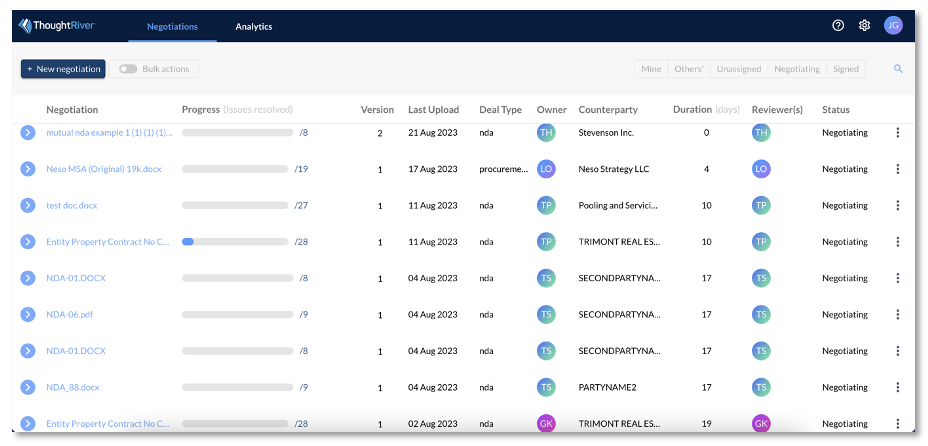The Importance of Following Contract Management Best Practices
Every business interacts with contracts on a daily basis. With so many contracts at play in a business’s operations, it becomes essential to follow contract management best practices. Let’s outline some of the best practices your business should follow to optimise its contract management process.
Develop a Contract Management Process
First and foremost, create a formal and consistent process for managing contracts. Designate specific roles for the parties who will handle the contracts, like the contract manager, legal, procurement, and the business owner. Establish a clear policy for handling contract renewal, termination, and execution. Ensure that everyone involved in this process is well-trained and understands the process.
Plan and Identify Risks
To ensure the successful execution of contracts, conduct thorough planning by evaluating the risks and potential challenges that could arise. Identify potential risks, track any that occur, and ensure mitigation plans and backups are in place. Consider involving the right stakeholders and conducting a thorough risk assessment.
Centralise All Contract Information
Storing and organising all contract information in a single, centralised digital repository will make the contract management process more efficient. A central repository can aid in the management of contracts, help with easy retrieval, track contract renewals, and ensure compliance requirements are met.
Track and Monitor Contract Performance
Contract performance tracking and monitoring is critical for a successful partnership. It is essential to set milestones and KPIs that are achievable, quantifiable, and monitor the progress of the project.
Tracking and monitoring contract performance increases accountability, ensures compliance with the contract, and helps mitigate risks. Assign tasks and responsibilities to specific staff members and discuss the progress regularly.
Ensure Compliance of all Contracts
Understand the regulatory requirements of contracts in your industry, and ensure contracts conform. Ensure that specific clauses, terminations, and renewal provisions meet applicable local and federal laws. Ensure compliance to reduce the risk of any legal or financial penalties that could arise.
Manage Contract Renewal and Termination
It's essential to keep track of contract obligations and renewals to avoid missing critical milestones. Establish a system for monitoring contract expirations and renewal deadlines to avoid any misunderstandings or disputes. Even with proper management practices, it may not be possible to renew every contract.
In some cases, it may be necessary to terminate the agreement. When terminating a contract, ensure that all parties are aware of the termination process, and the reasons for termination are clearly stated.
Invest in Contract Management Software
Using a contract management software platform can help improve collaboration, automate workflows, speed up the contract lifecycle, and free up time spent on manual tasks. A powerful tool equipped with notifications, document management, and electronic signature capabilities, can help to streamline the entire contract management process.
Best Contract Management Practices for Different Industries
Contract management best practices can vary across industries due to the unique challenges and specificities each industry faces. Below, we delve into some of the best practices in different sectors.
Contract Management in IT and Software Development
- Flexible Licensing: Ensure contracts have provisions for flexible software licensing, scaling up or down based on requirements.
- Intellectual Property (IP) Protection: Clearly define the ownership of developed software, code, or any proprietary technology.
- Service Level Agreements (SLAs): Establish SLAs for uptime, support response, and resolution times.
Construction and Real Estate Contract Management Best Practices
- Scope Clarity: Clearly define the project's scope, including specifications, materials, and standards.
- Performance Bonds: These ensure a project's completion in case a contractor fails to deliver.
- Progress Milestones: Break projects into stages with specific milestones for payments and assessments.
Contract Management Best Practices in Healthcare
- Data Privacy and Compliance: Contracts must comply with regulations like HIPAA (in the U.S.) to ensure patient data protection.
- Service Quality Metrics: Establish metrics to measure the quality of healthcare services provided.
- Cost Management: Contracts should outline costs transparently, including potential overruns or unexpected expenses.
Retail and Supply Chain Contract Management Best Practices
- Delivery Terms: Clearly state delivery timelines, methods, and potential penalties for delays.
- Quality Standards: Define the quality and standards of goods or services to avoid disputes.
- Volume Discounts and Rebates: Outline any volume-based price incentives in the contract.
Energy and Utilities Contract Management
- Regulatory Compliance: Ensure that all contractual obligations follow industry regulations.
- Price Fluctuations: Include provisions addressing fluctuations in energy prices or raw materials.
- Environmental Considerations: Detail any environmental protection measures or requirements.
Best Practices of Contract Management in Finance and Banking
- Data Security: Contracts, especially with third-party vendors, should emphasise stringent data security measures.
- Regulatory Adherence: Contracts must adhere to industry regulations such as those related to anti-money laundering or consumer protection.
- Transparent Fees: Clearly define all fees, penalties, and charges associated with services.
Entertainment and Media Contract Management Best Practices
- Royalty Agreements: Detail how royalties are calculated, distributed, and reported.
- Rights Management: Clearly specify the rights for content distribution, adaptation, and syndication.
- Exclusivity Clauses: Address any exclusivity requirements, whether for talent or distribution rights.
Manufacturing Contract Management Best Practices
- Quality Assurance: Detail the quality checks and standards products must pass.
- Supply Guarantees: Contracts with suppliers should guarantee consistent and timely delivery of raw materials.
- Returns and Recalls: Clearly state procedures for product returns, defects, or recalls.
By adopting these best practices tailored to each industry's unique demands, businesses can optimise contract performance, reduce risks, and ensure compliance.
Final Thoughts: Importance of Contract Management Best Practices
In conclusion, contract management plays a crucial role in business operations. Ineffective contract management can lead to costly litigation, wasted productivity, missed opportunities, and lost revenue. By following these best practices, you can ensure that your contracts are well-documented, tracked, monitored, and properly renewed or terminated. It is essential to establish guidelines that promote transparency, communication, and collaboration between all parties involved.
With these practices in place, businesses can feel confident in executing successful contracts, maintaining fruitful relationships, and navigating the ever-changing landscape of the business world.
FAQ
What is contract management?
Contract management refers to the comprehensive process of creating, executing, and analysing contracts to maximise operational and financial performance while minimising risk.
Why are best practices important in contract management?
Best practices ensure standardisation, improvements in efficiency, risk mitigation, and guarantee that contracts are compliant, clear, and beneficial to all involved parties.
What are the potential risks of poor contract management?
Poor contract management can lead to financial losses, legal disputes, damaged business relationships, loss of business opportunities, and reputational damage.
How can contract risks be mitigated?
Risks can be mitigated by clear definition of terms, regular monitoring and compliance checks, setting up clear dispute resolution mechanisms, and using best practices in drafting and executing contracts.
How can technology aid in contract management?
Contract management software can automate processes, track contract lifecycles, send reminders for renewals or deadlines, ensure compliance, and provide analytical insights, making the management process more streamlined and efficient.
How often should contracts be reviewed?
While the frequency can depend on the contract type, it's advisable to review contracts at least annually or whenever there are significant regulatory, business, or environmental changes.
What's the role of communication in contract management?
Open and effective communication fosters understanding, helps in clarifying doubts, addresses concerns, and resolves disputes promptly, ensuring smooth contract execution.
How should disputes in contracts be handled?
A clear dispute resolution mechanism, including mediation or arbitration clauses, should be established in the contract. This provides a structured and agreed-upon approach to resolving conflicts.
Are standardised templates advisable for contract creation?
Yes, standardised templates improve consistency, save time, and reduce potential errors or omissions. However, customisation might be required based on the specific needs of a contract.
How can contract management be made more efficient?
By adopting contract management software, regularly training stakeholders, maintaining a centralised contract repository, and setting clear performance metrics, the efficiency of contract management can be enhanced.
Is it necessary to have a dedicated contract management team?
For larger organisations with numerous and complex contracts, a dedicated team is advisable. Smaller entities might manage with a single responsible person, assisted by intelligent contract management software, but having expertise in the area is crucial.






